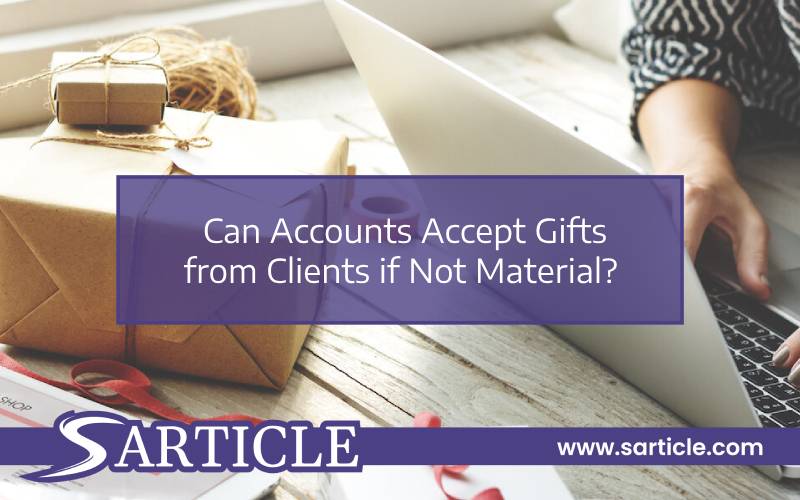The relationship between accountants and their clients is built on trust, professionalism, and ethical conduct. In this context, the acceptance of gifts from clients raises important questions regarding conflicts of interest, independence, and the perception of bias. While it is generally advisable for accountants to refrain from accepting gifts, there may be situations where non-material gifts can be accepted without compromising ethical standards. In this article, we will explore the ethics surrounding accepting gifts in the accounting profession, discuss guidelines and considerations, and provide insights on how to navigate this delicate issue.
The Ethics of Accepting Gifts
Independence and Objectivity
One of the core principles of the accounting profession is independence. Accountants must remain impartial and objective when providing services to their clients. Accepting gifts, especially material ones, can create a perception of bias or compromise objectivity. Therefore, many professional accounting bodies discourage or limit the acceptance of gifts to maintain the integrity of the profession.
Conflicts of Interest
Accepting gifts from clients can potentially lead to conflicts of interest. Accountants have a fiduciary duty to act in the best interest of their clients and should avoid situations that may compromise their ability to provide objective advice or make unbiased decisions. Gifts can create an obligation or expectation that may hinder an accountant’s ability to act independently.
Perception of Bias
Even if the gift itself does not influence an accountant’s judgment, the perception of bias can damage the reputation and trustworthiness of both the accountant and the profession as a whole. Clients, stakeholders, and the public expect accountants to maintain a high level of integrity and professionalism, and accepting gifts can raise doubts about their impartiality.
Guidelines for Accepting Gifts
Professional Codes of Conduct
Professional accounting bodies, such as the American Institute of Certified Public Accountants (AICPA) and the International Federation of Accountants (IFAC), provide guidelines on accepting gifts. These codes of conduct emphasize the importance of independence, objectivity, and maintaining the public’s trust. Accountants should familiarize themselves with these guidelines and adhere to the principles outlined.
Material vs. Non-Material Gifts
While material gifts, such as cash or valuable items, are generally discouraged, non-material gifts may be more acceptable. Non-material gifts can include tokens of appreciation, small gestures, or symbolic items that hold little intrinsic value. However, accountants should exercise caution even with non-material gifts to ensure that they do not compromise their objectivity or create conflicts of interest. (thisnation)
Consider the Intent and Frequency
When deciding whether to accept a non-material gift, accountants should consider the intent behind the gesture. If the client’s intention is to show appreciation or gratitude, and the gift is of nominal value and infrequent, it may be more acceptable. However, if the gift appears to be an attempt to influence the accountant’s judgment or is offered excessively, it raises red flags and should be declined.
Transparency and Disclosure
To maintain transparency and avoid any perception of impropriety, accountants should be transparent about their gift policies. Clearly communicate to clients and stakeholders the guidelines regarding gift acceptance. This transparency helps establish trust and ensures that all parties understand the boundaries and expectations.
Consult with Colleagues and Professional Networks
If uncertain about whether to accept a gift, it can be beneficial to seek guidance from colleagues, mentors, or professional networks. Discussing the situation with others in the profession can provide valuable insights and help make an informed decision aligned with ethical standards.
Conclusion
While the accounting profession emphasizes independence, objectivity, and ethical conduct, the question of accepting gifts from clients requires careful consideration. While material gifts should generally be declined, non-material gifts may be accepted in certain situations. However, accountants must always prioritize their independence, objectivity, and the public’s perception of their professionalism. Transparency, adherence to professional codes of conduct, and thoughtful evaluation of the intent and frequency of gifts are essential. By navigating this issue with integrity and ethical awareness, accountants can maintain the trust of their clients and uphold the reputation of the accounting profession.


